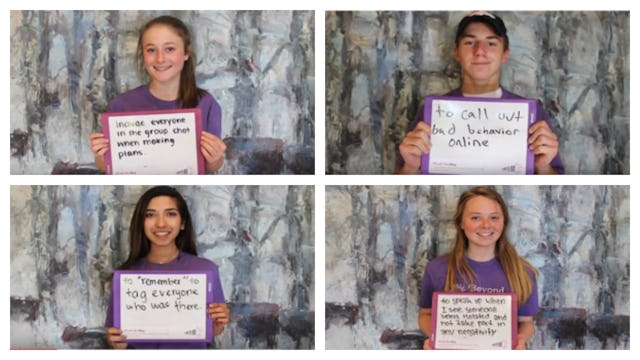#CallItOutDay Empowers Kids To Be Kind Online

It was a Sunday morning and my sixth-grade daughter looked glum and distracted. Even the plateful of sweet French toast — her favorite — wasn’t making her happy. Her phone, which was plugged in on the counter and not with her at the table, per our phone contract, kept buzzing and lighting up. Clearly something was going down.
RELATED: 105 Kindness Quotes That Will Remind You To Be A Good Human
“What’s the deal?” I asked, gesturing at the phone.
“Nothing,” she answered without making eye contact. Which of course meant something, but something she didn’t want to get into. I let it go. She finished her French toast, cleared her plate, and picked up her phone.
“Ugh! Why do Lily and Riley have to post photos of what they’re doing every two seconds? It’s so annoying! I mean, I get that they’re hanging out without me, again, but do they have to shove it in my face?”
Good question. And the answer there would be no, they don’t.
Navigating the delicate social scene of middle school has always felt like an unfortunate rite of passage. Now, with smartphones and other devices keeping our kids connected day in and day out, it’s even harder to take a social break. According to Influence Central 2016 Digital Trends Study, 50% of kids have social media accounts by age 12 and 64% have internet access via their own device.
Negative social interactions online can wield a lot of power when it comes to how our tweens feel about themselves and others. When kids post photos of themselves with one or two other friends, “forget” to tag kids, or consistently leave the same few kids off a group chat, it’s isolating for those who get left out. Middle school is rough enough with all the emotional, physical, and academic challenges happening. Social shunning on top of that just makes life exponentially worse.
That’s why April 28 is Call It Out Day. This Positive Prevention Initiative is the third in a series from Beyond Differences that includes No One Eats Alone and Know Your Classmates. Call It Out Day is a free in-school event designed to empower middle school kids to speak up when they see social isolation happening online. The curriculum offers ways to respond to digital gossip and exclusion and helps tweens and teens be their true selves online.
Seems pretty straightforward, right? But remember, we’re talking about kids ages 11 to 14 who are just starting to figure out who they are and how they fit in. Peer pressure is real and forceful at this age. Edicts handed down from teachers and parents usually don’t go over very well with this crowd. Beyond Differences recognizes this challenge. The genius of this program is that it gives students the tools they need to make compassionate, positive choices online, but it’s up to them to make it happen.
Watching kids take the #CallItOutDay pledge, I have to say, I was truly impressed. I mean, how much courage does it take for a tween to speak out publicly against a perceived majority, even if that majority is relatively anonymous? I was bullied in middle school and never told anyone about it — not a teacher, not my parents. Of course, other kids knew it was happening, but they didn’t want to risk social isolation themselves by alerting an adult. Had there been anti-bullying or social isolation curriculum in place, maybe my few weeks of social torture would have ended sooner or not even happened at all.
So far, more than 400 schools have signed up to be part of the #CallItOutDay campaign. Check to see if your school is already part of the action, and if not, sign up — it’s free. Parents can also participate in the campaign and can review the curriculum by signing up. There are four lesson plans leading up to Call It Out Day.
If April 28 doesn’t work for your school, you can incorporate the curriculum anytime. The goal is for our middle school kids to learn how to change the story from negative to positive, exclusive to inclusive and cruel to kind. Not everyone is going to be best friends with everyone else, but all kids can stand up to bad behavior when they see it. Understanding what it is, how hurtful it can be, and how to change it is what Call It Out Day is all about.
For more information and to sign up, go to CallItOutDay.org.
This article was originally published on